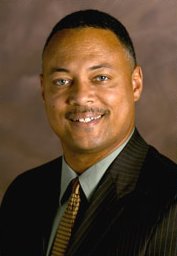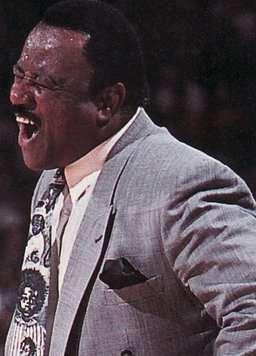As a Razorback from 1984 to 1988, point guard Allie Freeman experienced first-hand one of the most turbulent periods in the history of the basketball program. The Little Rock native was a freshman during Eddie Sutton's often rocky last season in Fayetteville and was a member of Nolan Richardson's first three Hog teams. In Allie's sophomore season, the team compiled an overall record of 12-16 and a 4-12 mark in Southwest Conference play. Only two years later, however, the Hogs had won more than 20 games and were back in the NCAA Tournament. In the years since, Richardson has spoken admiringly of Freeman and fellow classmates Stephan Moore and Andrew Lang for sticking with him and the program during those trying times.
Today, Allie is the youth apprenticeship program manager at the Little Rock School District's Metropolitan Career and Technical Center. He also is a member of the Central Arkansas Transit Authority's Board of Directors, and he is president of Imprinted Solutions Group, a promotional products company that he runs with his brothers.
Needless to say, he is a busy man these days, but he was gracious enough to talk with us recently about his Razorback career. Many, many thanks to Allie for doing so. And now, read on to find out his reaction to Coach Sutton's departure, his first impression of Coach Richardson and his recollections of that very difficult 12-16 season.

Expats: Your freshman season was Coach Sutton's last year. The team ended up doing pretty well in the end, but there were some struggles as well. What was that season like for you?
Freeman: It was a pretty exciting time, getting adjusted to college life. It was a transition. I dealt with some personal difficulty before the season. During the preceding summer, I lost my brother.
It was an interesting season. It was exciting in the sense that Razorback basketball at the time was in a pretty good spot. The program had been developed well by Coach Sutton, and the guys that were freshmen - guys like Andrew Lang, Byron Irvin, myself - we felt like we could be on the verge of something special. We were looking forward to winning.
Joe Kleine and Charles Balentine were seniors my freshman year, and those two guys were great leaders. We accomplished a lot that year. We won more than 20 games, and we made it to the NCAA Tournament.
But after we beat Iowa in the first round of the NCAA Tournament, in Salt Lake City, USA Today prints a story saying that Coach Sutton might leave to go to Auburn to replace Sonny Smith.
We have a meeting at the team hotel, and Coach Sutton wants to reassure us that he's not going anywhere. But after the tournament, Coach Sutton announces that he's leaving to go to Kentucky.
That was a weird experience. A lot of us were committed to playing at that program, but we had never really thought about Coach Sutton leaving.
Expats: In the days just before the announcement, did you have a sense that that might happen?
Freeman: After the situation with the USA Today article, it got you to thinking. But when it happened, when he said he was going to Kentucky, everybody was like, "Wow!"
At the time, we thought that Coach Dickey and Coach Brown would try and stay on [editor's note: Dickey and Brown were Sutton's assistants] . About a day or two later, Coach Dickey told us that he was going to leave and go with Coach Sutton. I remember that Kenny [Hutchinson] and Byron, they were pretty hurt by that. It almost brought them to tears. We had developed some bonds, and we were really looking forward to working with that staff.
One of the weird things for me was, when I was being recruited, I was going to make an official visit to Kentucky. But it was kind of a last-minute thing, and I didn't make the visit. It was kind of ironic that he ended up going to Kentucky, and that was a place that was trying to recruit me at the last minute.
The next few days, Andrew Lang was walking around campus with a Kentucky shirt on (laughs). I was like, "Andrew, what's going on? What's happening?" And he said, "Coach Sutton asked me to go to Kentucky with him." I said, "He did? What are you going to do?"
We talked about it. We all had to consider our options. I never really got to thinking that I would leave. I felt committed to the university.
Stephan Moore got a call from Coach Sutton. He told him that he would like for him to consider going. Next thing I know, I got a phone call about going to Kentucky.
The rules at that time were a lot different. I don't think he was necessarily tampering. Coach Dickey was like, "Hey, the opportunity would be there if you all want it." That kind of thing. It wasn't like, "We gotta have you. We need you." It wasn't like they were trying to meddle in the recruiting. A lot of stuff was still up in the air.
Coach Broyles wanted to act quickly and find a replacement. I think he consulted with Coach Sutton. He may have even asked Coach Sutton about his pick. They weren't on very good terms when Coach Sutton left. But I guess they tried to be professional. I was told that Coach Sutton said that Coach Richardson would be a pretty good hire. That's what I was told. I don't know how that actually turned out.
A lot of us players were hoping that our assistant coach Bill Brown would have been given a look. He had been with the program a while, and we felt close to him.  Expats: What were your impressions of Coach Richardson when you were first introduced to him?
Expats: What were your impressions of Coach Richardson when you were first introduced to him?
Freeman: He has a certain presence that strikes you. He is very serious about his business. When he came in, he felt that this was an opportunity that had eluded him in the past. He was really ready.
I didn't know about the personal struggles that he was dealing with, his daughter's illness [editor's note: Richardson's daughter Yvonne was battling leukemia at the time; she died during Richardson's second season at Arkansas]. He never made that an issue. He had to be really struggling with that, but we didn't know it.
One of my teammates, Stephan Moore - Coach Richardson had recruited him out of Oklahoma. Stephan said that one of the concerns he had was that the times he had seen Coach Richardson's teams in the NCAA Tournament, they did not seem able to advance very far in the tournament.
Stephan was looking at Arkansas and seeing Arkansas advance far into the tournament and doing well. That was one of the critical thoughts that Stephan had. That had maybe been an indicator to Stephan to come to Arkansas.
I think Coach Richardson looked at this as an opportunity for his teams to take the next step. He was all business. But, we were still 17- and 18-year-old kids, trying to adjust and figure out what all was going on. It was somewhat of a challenge.
Expats: From a personal standpoint, how difficult was your sophomore year? The team really struggled that season.
Freeman: It was a tough year, but it was a tough year because we lost so many close games. If you go back and look, a lot of those were close games. A few games weren't.
Mentally, it wore on us because we had had that success the year before. We didn't have Joe and Charles around, but some of the success that we had had the year before was due to the young players, the things that we added to the mix. So we felt like we had a foundation.
We had to adjust to Coach Richardson and his practice style, his habits, the way he liked to do things, and a lot of us had some maturing and growing up to do. And again, we didn't fully understand all of the personal struggles that he was going through.
We would have situations where Coach Richardson would be at practice on Monday and Tuesday, and then he would be at the Mayo Clinic on Wednesday and Thursday. Coach [Andy] Stoglin would take over and run practices, and Coach Richardson would come back in for practice the day before the game, and then we'd play.
There were a lot of factors that led to us struggling that year. I personally believe we probably would have been much better off if Coach Broyles had just said to Coach Richardson, "Coach, you need to take some time off. You need to take a leave of absence to take care of your family."
Even if that had been offered, I don't think Coach Richardson felt secure enough as far as his job was concerned - and I can understand that feeling - to have done that kind of thing. I think he just felt like it was just a tough situation for him.
Fans were fair in the sense that their expectations were high, but to some degree, fans were a little bit unfair too. Coach Richardson used to say, "I will never win a game, and you guys will never lose a game." That's what he would always say. He always had that philosophy.
He looked at this as a fight, as a war. And he was trying to fight for his survival. We didn't really catch that until we got halfway through the year, and if you'll notice, we started to play better at the end of the year. We wished there had been more time to play.
My junior year, we went up. And my senior year, we went way up. We laid the foundation and started the climb, the ascension that led to the 1994 national championship.
Coach Richardson said that he would always remember his first team and the battles, the struggles. He felt like we were a big part of them being successful. He said that to me personally several times. He had a lot of respect for the guys that played on that first team.
Tomorrow: Allie talks about the wild and crazy NIT game against Arkansas State, the most depressing loss of his career and Whodini's "Five Minutes of Funk." And while you're waiting for Part 2, sign up to follow us on Facebook and Twitter.
